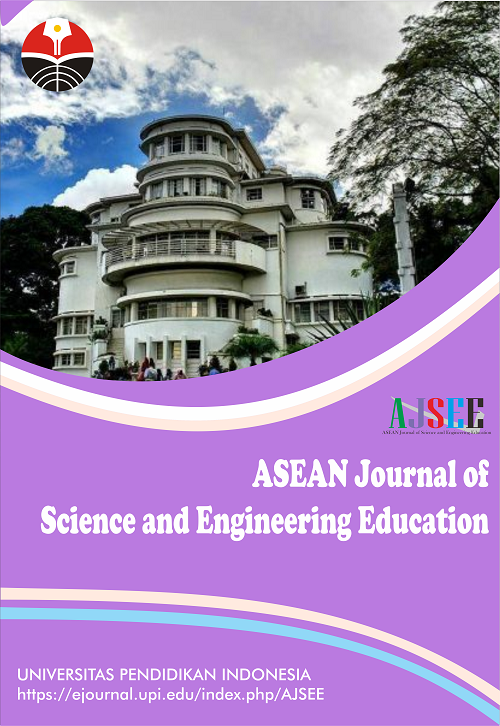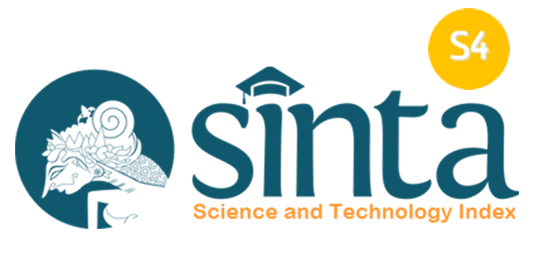Exploration of Students' Attitudes Towards Science: A Case Study Research in Junior High Schools
Abstract
Keywords
Full Text:
PDFReferences
Agustami, R. P., Wiyanto, W., and Alimah, S. (2017). Persepsi guru dan siswa terhadap pembelajaran IPA Terpadu serta implikasinya di SMP. Journal of Innovative Science Education, 6(1), 96-103.
Anwar, N. P., and Bhutta, S. M. (2014). Students’ attitude towards science in lower secondary classes: Comparison across regions. Journal of Educational Research, 17(1), 77.
Astalini, A., and Kurniawan, D. A. (2019). Pengembangan instrumen sikap siswa sekolah menengah pertama terhadap mata pelajaran IPA. Jurnal Pendidikan Sains (JPS), 7(1), 1-7.
Astalini, A., Dwi Agus Kurniawan, D., and Lika, A. (2019). Correlation between confidence with attitude toward science in secondary school in Indonesia. Beder University Journal of Education Sciences 20(1), 30-45.
Astalini, A., Kurniawan, D. A., Darmaji, D., and Anggraini, L. (2020). Comparison of students’ attitudes in science subjects in urban and rural areas. Journal of Educational Science and Technology, 6(2), 126-136.
Azwar, S. (2005). Signifikan atau sangat signifikan. Buletin Psikologi UGM, 13(1), 38-44.
Chi, S., Wang, Z., Liu, X., and Zhu, L. (2017). Associations among attitudes, perceived difficulty of learning science, gender, parents’ occupation, and students’ scientific competencies. International Journal of Science Education, 39(16), 2171-2188.
Emily Oon, P. T., and Subramaniam, R. (2023). Gender differences in attitudes towards science: comparison of middle school students in England, Singapore, and USA using complete TIMSS 2011 data. Research in Science and Technological Education, 1-20.
Fasasi, R. A. (2017). Effects of ethnoscience instruction, school location, and parental educational status on learners’ attitude towards science. International Journal of Science Education, 39(5), 548-564.
Fauzan, I. (2023). Pengaruh kemandirian belajar dan kedisiplinan belajar terhadap penguasaan konsep IPA. Journal of Innovation Research and Knowledge, 3(5), 1003-1014.
Hillman, S. J., Zeeman, S. I., Tilburg, C. E., and List, H. E. (2016). My attitudes toward science (MATS): The development of a multidimensional instrument measuring students’ science attitudes. Learning Environments Research, 19, 203-219.
Iskender, M. (2009). The relationship between self-compassion, self-efficacy, and control belief about learning in Turkish university students. Social Behavior and Personality: an International Journal, 37(5), 711-720.
Kapici, H. O., Akcay, H., and de Jong, T. (2020). How do different laboratory environments influence students’ attitudes toward science courses and laboratories? Journal of Research on Technology in Education, 52(4), 534-549.
Kurniawan, D. A., Astalini, A., and Kurniawan, N. (2019a). Analisis sikap siswa SMP terhadap mata pelajaran IPA. Lentera Pendidikan: Jurnal Ilmu Tarbiyah Dan Keguruan, 22(2), 323-334.
Kurniawan, D. A., Astalini, A., and Kurniawan, N. (2019b). Sikap Siswa Terhadap Pelajaran IPA di SMP Kabupaten Muaro Jambi Provinsi Jambi. Curricula: Journal Of Teaching and Learning, 4(3), 20.
Lee, S., and Kim, S. H. (2018). Scientific knowledge and attitudes toward science in South Korea: does knowledge lead to favorable attitudes? Science Communication, 40(2), 147-172.
Lu, Y. Y., Chen, H. T., Hong, Z. R., and Yore, L. D. (2016). Students’ awareness of science teachers’ leadership, attitudes toward science, and positive thinking. International Journal of Science Education, 38(13), 2174-2196.
Machrus, H., and Purwono, U. (2012). Pengukuran perilaku berdasarkan theory of planned behavior. Jurnal Insan Media Psikologi, 12(1), 64-72.
Montes, L. H., Ferreira, R. A., and Rodríguez, C. (2018). Explaining secondary school students’ attitudes towards chemistry in Chile. Chemistry Education Research and Practice, 19(2), 533-542.
Orawiwatnakul, W., and Wichadee, S. (2017). An investigation of undergraduate students' beliefs about autonomous language learning. International Journal of Instruction, 10(1), 117-132.
Perera, L. D. H. (2014). Parents' attitudes towards science and their children's science achievement. International Journal of Science Education, 36(18), 3021-3041.
Perme, M. P., and Manevski, D. (2019). Confidence intervals for the Mann–Whitney test. Statistical Methods in Medical Research, 28(12), 3755-3768.
Ramdhani, N. (2011). Penyusunan alat pengukur berbasis theory of planned behavior. Buletin Psikologi, 19(2), 55-69.
Said, Z., Summers, R., Abd-El-Khalick, F., and Wang, S. (2016). Attitudes toward science among grades 3 through 12 Arab students in Qatar: findings from a cross-sectional national study. International Journal of Science Education, 38(4), 621-643.
Siswandoko, T., and Suryadi, A. (2013). Kompetensi, sertifikasi guru, dan kualitas belajar siswa sekolah dasar. Jurnal Pendidikan dan Kebudayaan, 19(3), 305-314.
Smith, T. J., Pasero, S. L., and McKenna, C. M. (2014). Gender effects on student attitude toward science. Bulletin of Science, Technology and Society, 34(1-2), 7-12.
Summers, R., and Abd‐El‐Khalick, F. (2018). Development and validation of an instrument to assess student attitudes toward science across grades 5 through 10. Journal of Research in Science Teaching, 55(2), 172-205.
Suryadi, A., Mirnawati, M., and Fadhilah, N. (2020). Perbedaan sikap siswa terhadap sains: studi berdasarkan level pendidikan dan gender. Jurnal Pendidikan Matematika Dan IPA, 11(2), 206-216.
Toma, R. B., Greca, I. M., and Orozco Gómez, M. L. (2019). Attitudes towards science and views of nature of science among elementary school students in terms of gender, cultural background, and grade level variables. Research in Science and Technological Education, 37(4), 492-515.
Wassalwa, M., Evendi, E., Huda, I., Yusrizal, Y., Halim, A., and Saminan, S. (2022). Sikap peserta didik terhadap sains di sekolah menengah pertama dan madrasah tsanawiyah negeri kabupaten aceh jaya. Jurnal Penelitian Pendidikan IPA, 8(2), 709-717.
Yusmar, F., and Fadilah, R. E. (2023). Analisis rendahnya literasi sains peserta didik indonesia: hasil pisa dan faktor penyebab. LENSA (Lentera Sains): Jurnal Pendidikan IPA, 13(1), 11-19.
DOI: https://doi.org/10.17509/ajsee.v5i1.74640
Refbacks
- There are currently no refbacks.
Copyright (c) 2024 Universitas Pendidikan Indonesia

This work is licensed under a Creative Commons Attribution-ShareAlike 4.0 International License.














